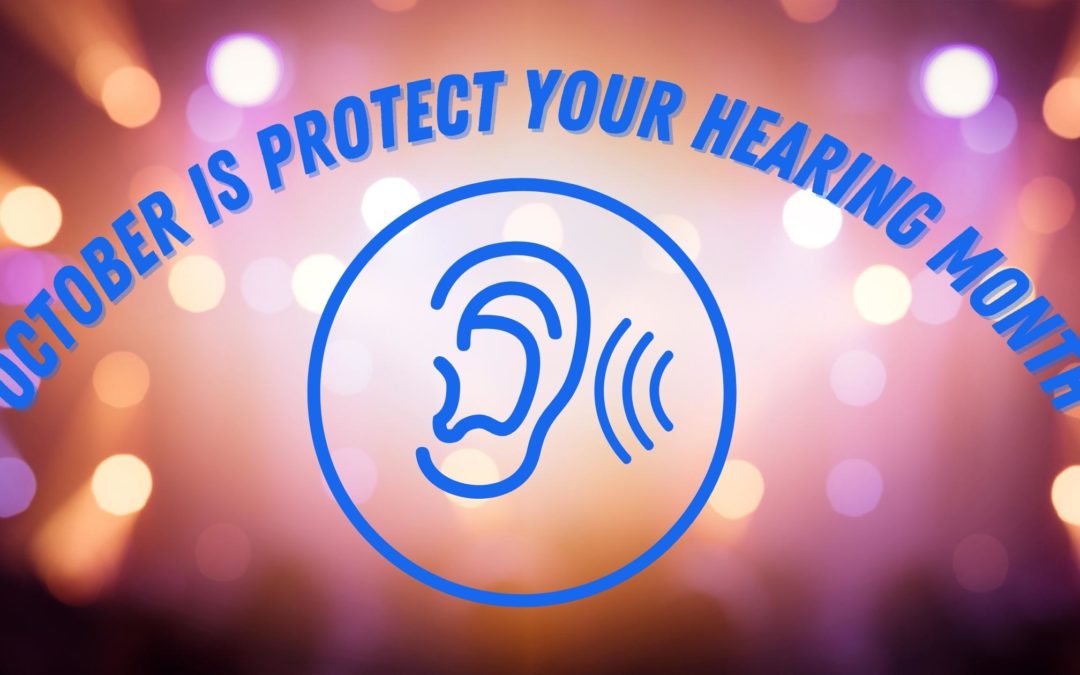October is Protect Your Hearing Month! This month focuses on raising awareness about hearing loss and ways you can protect your hearing health. More and more people are at higher risk of impaired hearing due to loud noise exposure. It is important to learn and practice ways you can reduce your risk and enhance your hearing health!
How Hearing Works
The auditory system is the sensory system that enables us to process and understand speech and sound. It is made up of the ears and brain which work together to detect and process incoming sound from the environment. This process consists of:
- Outer ear: the most visible part of the ear, the outer portion absorbs soundwaves from the environment which then travels down the ear canal and lands on the eardrum, producing vibrations.
- Middle ear: the movement of the eardrum activates the ossicles, three tiny connected bones, which help propel the soundwaves further into the inner ear.
- Inner ear: the sensory cells and fluid in the cochlea help convert soundwaves into electrical signals. These signals are then carried, by the auditory nerve, to the brain where they are further processed and assigned meaning to.
Various factors can affect this process, leading to hearing loss. This includes existing medical conditions like hypertension, cardiovascular disease, and diabetes. Additionally, aging is another major contributing factor, with age-related hearing loss (also known as presbycusis) being common among older adults. One of the most common causes of hearing loss is loud noise.
Loud Noise & Hearing Loss
One-time or regular exposure to loud noise can cause irreparable damage to the auditory system. Loud noise can cause the tiny sensory cells (also referred to as hair cells) to lose sensitivity and/or die. These cells, unlike other types of cells we have, do not regenerate. Humans are born with all the hair cells in each ear that we will ever have – about 12,000 in each ear. This means that when they experience damage, it has permanent effects. Loss of sensory capacity reduces their ability to translate incoming sound waves, leading to hearing loss.
Sound is measured in units known as decibels (dB), and sound above 85dB can be hazardous for hearing health. 85dB is the equivalent of busy city traffic and household appliances like a hairdryer or vacuum cleaner. People can be exposed to 85dB of noise for 8 hours per day without harming hearing but the sound that exceeds this volume increases the risk of damaging hearing. Experts recommend cutting exposure time to noise above 85dB by half (for every 3 decibels):
- 85dB: 8 hours / day
- 88dB: 4 hours / day
- 91dB: 2 hours / day
Reducing exposure and absorption of loud noise is an incredibly important way to protect your hearing health. This is especially necessary because more and more people are at higher risk of impaired hearing due to loud noise from personal audio devices. The World Health Organization estimates that over 1 billion people worldwide (ages 12-35) experience a high risk of noise-induced hearing loss from listening to the audio on their electronic devices as well as loud noise exposure from entertainment venues.
Tips to Protect Hearing Health
There are numerous safety measures you can practice to reduce your risk of developing hearing loss. Simple tips include the following:
- Wear protective gear: headphones and other earwear like earbuds, earplugs, earmuffs, etc. offer great protection. They provide a protective barrier for the ear which reduces the amount of loud noise you absorb.
- Maintain low volume: personal audio devices can reach 110dB which is dangerous for hearing. It is critical to maintaining lower volume settings which you can do by investing in noise cancellation headphones. These are designed to minimize background noise, preventing the need to increase volume while navigating louder settings.
- Reduce loud noise exposure: monitor the decibels in the environment you are in by downloading an app, this is a helpful way to determine how long you can safely be in that environment. You can also reduce exposure by avoiding louder places (restaurants, bars, etc.) during peak hours, turning off loud household appliances, avoiding loud traffic areas, etc.
Another important way to prioritize your hearing health is by scheduling an appointment for a hearing test! Hearing tests involve a painless process that identifies your hearing needs and the most effective way to meet those needs. This can transform your hearing health and everyday life!


